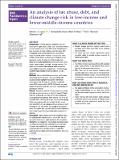An analysis of tax abuse, debt, and climate change risk in low- and lower-middle-income countries
Abstract
Introduction Climate change is exacerbating a pre-existing child rights crisis. Lower- (low- and lower-middle-) income countries have borne 99% of the disease burden from the crisis, of which children under five carry 90%. In response, much of the recent global policy efforts focus on climate action. However, unsustainable levels of debt and tax abuses are draining countries of crucial revenue to handle the crisis. Like the climate crisis, these are primarily facilitated by entities domiciled within higher- (upper-middle- and high-) income countries. This paper aims to review these revenue leaks in countries where children are at the greatest risk of climate change to identify opportunities to increase climate change resilience. Methods We compiled data on tax abuse, debt service and climate risk for all lower-income countries with available data to highlight the need for intervention at the global level. We used the Climate Change Risk Index (CCRI), developed by UNICEF. Additionally, we used figures for tax abuse and debt service as a percentage of government revenue. Results We present data on 62 lower-income countries with data on revenue losses, of which 55 have CCRI data. Forty-two of these 62 countries (67.7%) are at high risk of lost government revenues. Forty-one (74.5%) of the 55 countries with CCRI data are at high risk of climate change. Thirty-one countries with data on both (56.4%) are at high risk of both climate change and revenue losses. Most countries at high risk of both are located in sub-Saharan Africa. This shows that countries most in need of resources lose money to arguably preventable leaks in government revenue. Discussion Higher-income countries and global actors can adopt policies and practices to ensure that they do not contribute to human rights abuses in other countries. Highlighting the impact of a failing global economic model on children’s economic and social rights and one which increases their vulnerability to the climate emergency could help drive the transition towards a model that prioritises human rights and the environment on which we all depend.
Citation
Lopez , M , O'Hare , B A-M , Hannah , E A & Hall , S 2022 , ' An analysis of tax abuse, debt, and climate change risk in low- and lower-middle-income countries ' , BMJ Paediatrics Open , vol. 6 , no. 1 , e001518 . https://doi.org/10.1136/bmjpo-2022-001518
Publication
BMJ Paediatrics Open
Status
Peer reviewed
ISSN
2399-9772Type
Journal article
Collections
Items in the St Andrews Research Repository are protected by copyright, with all rights reserved, unless otherwise indicated.

